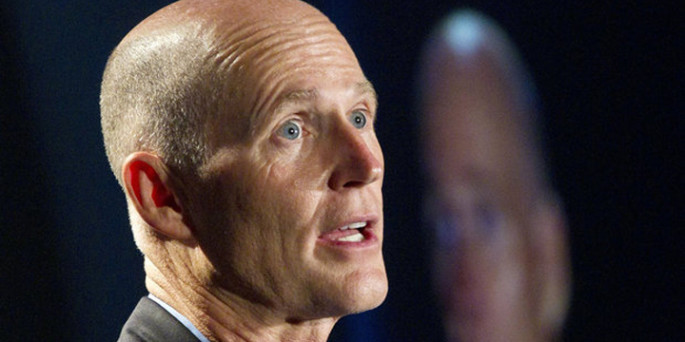
Florida pays lip service to health care for the poor
What’s the difference between one federal dollar and another? None, you say. That’s the right answer, of course. But only if you speak the language of facts and logic. Florida governor Rick Scott and Republican lawmakers in the state’s House of Representatives are not fluent in that language, however. Otherwise Scott would not be vowing to sue the federal government (as he announced last week) for declining to provide a bunch of federal money for one health care program while refusing to accept a pile of federal dough for a different health care program.
What’s the deal? The deal is that one stack of dollars, the Low Income Pool (LIP), pays hospitals for “uncompensated expenses.” That’s when someone shows up at the emergency room in a condition serious enough that by law the hospital cannot turn them away regardless of whether they have insurance or the ability to pay out of their own pocket. Naturally, Scott, a former executive in the hospital industry, likes these dollars.
The dollars he doesn’t want and refuses to take are those intended to expand Medicaid. Those dollars would provide health insurance to between 800,000 and 850,000 Floridians who now don’t have it because they can’t afford it. Evidently, Scott has less empathy for the hundreds of thousands of unfortunate people who must suffer the often awful consequences of not having health insurance than he does for the bottom line of the hospitals.It figures. For the four-plus years that Scott has been the top public official in Florida, he has never taken off his corporate mogul hat.
The loss of LIP money won’t make much difference to people who find themselves in the emergency room because of serious trauma, a heart attack, a stroke, or a diabetic coma. The hospital must treat them. But the loss of $2.2 billion in LIP money would take a bite out of the income of hospitals, many of them for-profit corporations.
Those who must endure the pain that failure to expand Medicaid will bring are not people who worry about their bottom line. They worry about not falling to the bottom of the barrel trying to pay for huge bills for medications and treatments they need desperately in order to stay well or even to avoid death.
Scott is less interested in these people’s travails than he is in practicing the GOP’s favorite pastime, bashing Barack Obama. “It is appalling that President Obama would cut off federal health-care dollars to Florida in an effort to force our state further into Obamacare,” Scott said last week through a press release quoted in the Orlando Sentinel.
Scott’s statement is ludicrous on so many levels it would be funny were the implications not so cruel. Force our state further into Obamacare? How could Obama manage that? Florida already leads all states in the number of enrollees in Obamacare. “Obamacare Central,” the Miami Herald calls the state.
Cutting health care dollars for one program in order to coerce the state to take free money for another? What a nefarious policy. Well, not really. The federal government has two things to say about that. First, LIP was not established as a permanent program and was always scheduled to expire on June 30. Second, it would make no sense to renew the LIP program because Medicaid expansion would not only provide coverage for those seeking emergency care, it would also make many emergency room visits unnecessary by covering preventive and routine care.
That’s a win-win situation in a world of facts, logic, and common decency. But Rick Scott doesn’t live in that world. His worry is not about the 800,000-850,000 people who won’t have health insurance for no reason other than Republican dogma. He is worried that if LIP dollars are cut off, some hospitals won’t get fully reimbursed for “uncompensated care.” Which shows that as far as Rick Scott goes, you can get the boy out of the corporate suite but you can’t take the corporate suit off the boy.
Meanwhile, as the lead article in Sunday’s Miami Herald puts it, people are trying to survive by “stitching together their medical care through personal ingenuity, half doses of medicines and low-cost clinics.”
They include people like Isabel Betancourt. As the Herald describes her coping strategy, “On the days when she feels good, when her elbows and knees aren’t stiff for hours and the bones in her feet don’t radiate near-crippling pain, Isabel Betancourt may skip the regimen of injections and pills that stop her immune system from destroying the cartilage and bone in her joints.”
Actually, it’s more of a desperate move than a strategy. The Miami Herald: “Missing her weekly injection of Enbrel and daily doses of other prescription drugs means Betancourt is risking the deformed joints and damaged organs that can come with rheumatoid arthritis.”
Is this any way to run a health care system?


